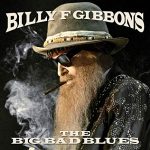Last month, we kicked off the new year with a round-up of all of the albums we reviewed in 2018 — along with new reviews of several notable releases we’d missed or hadn’t covered yet. Here’s a few more of our favorites that we’re still spinning two months into 2019 …
ALEJANDRO ESCOVEDO
The Crossing
Yep Rock
(released Sept. 14, 2018)
 In the wake of the health scare that nearly cut his life and oft-underappreciated career short, Alejandro Escovedo has spent the better part of the last two decades attacking his art with aggressive energy and restless prolificacy. The results have earned the San Antonio-born songwriter renewed appreciation from the music cognoscenti, with each new release invariably hailed by some critics as his best yet. But Escovedo’s latest, written and recorded with Italian musician and bandleader Don Antonio, is something more than just par for that already impressive course: It may well be the most ambitious project of the man’s life. Clocking in at a full hour (easily a double album if you spring for the vinyl, as one should), The Crossing is a concept album that loosely follows the journey of two young immigrants — one Mexican, the other Italian, but both heavily informed by Escovedo’s own first-hand experiences as a first-generation Mexican-American rocker — who cross rivers, oceans and wide swaths of the country in pursuit of an American dream that’s either long dead or hell-bent on thwarting them every step of the way. The story’s themes could not feel more timely or politically charged, and the musical scope is just as bold and uncompromising. Still bearing the imprint of late Lone Star legends like Doug Sahm and Townes Van Zandt (who didn’t predate him by too terribly much), not to mention his contemporary amigo Joe Ely (whose “Silver City,” the album’s lone cover, fits right in with the narrative), Escovedo can shout a line like “Texas is my mother” with homegrown chuzpah and conviction; but he filters that Texas troubadour aesthetic through an exotic Velvet Underground haze and spikes it with the sonic punch and attitude of the insurgent punk scene that he cut his teeth on in the ’70s. The Crossing‘s epic sprawl also makes time for indulgences like the groovy instrumental “Amor Puro,” the unhurried balladry of “Cherry Blossom Rain,” and the distorted garage of “MC Overload,” but it never once loses its passion or squanders the momentum. At the end of the record, one of the central characters, scarred and shaken by the journey, wonders if “the crossing” was worth it. His own doubts notwithstanding, the answer — at least in regards to this long, fruitful chapter in the ongoing career of one of America’s greatest living songwriters — is a definitive yes. — MIKE ETHAN MESSICK
In the wake of the health scare that nearly cut his life and oft-underappreciated career short, Alejandro Escovedo has spent the better part of the last two decades attacking his art with aggressive energy and restless prolificacy. The results have earned the San Antonio-born songwriter renewed appreciation from the music cognoscenti, with each new release invariably hailed by some critics as his best yet. But Escovedo’s latest, written and recorded with Italian musician and bandleader Don Antonio, is something more than just par for that already impressive course: It may well be the most ambitious project of the man’s life. Clocking in at a full hour (easily a double album if you spring for the vinyl, as one should), The Crossing is a concept album that loosely follows the journey of two young immigrants — one Mexican, the other Italian, but both heavily informed by Escovedo’s own first-hand experiences as a first-generation Mexican-American rocker — who cross rivers, oceans and wide swaths of the country in pursuit of an American dream that’s either long dead or hell-bent on thwarting them every step of the way. The story’s themes could not feel more timely or politically charged, and the musical scope is just as bold and uncompromising. Still bearing the imprint of late Lone Star legends like Doug Sahm and Townes Van Zandt (who didn’t predate him by too terribly much), not to mention his contemporary amigo Joe Ely (whose “Silver City,” the album’s lone cover, fits right in with the narrative), Escovedo can shout a line like “Texas is my mother” with homegrown chuzpah and conviction; but he filters that Texas troubadour aesthetic through an exotic Velvet Underground haze and spikes it with the sonic punch and attitude of the insurgent punk scene that he cut his teeth on in the ’70s. The Crossing‘s epic sprawl also makes time for indulgences like the groovy instrumental “Amor Puro,” the unhurried balladry of “Cherry Blossom Rain,” and the distorted garage of “MC Overload,” but it never once loses its passion or squanders the momentum. At the end of the record, one of the central characters, scarred and shaken by the journey, wonders if “the crossing” was worth it. His own doubts notwithstanding, the answer — at least in regards to this long, fruitful chapter in the ongoing career of one of America’s greatest living songwriters — is a definitive yes. — MIKE ETHAN MESSICK
JAIMEE HARRIS
Red Rescue
www.jaimeeharris.com
(released Sept. 21, 2018)
 Jaimee Harris’ name has showed up so many times in the music pages of the Austin Chronicle and Austin American-Statesman over the last three or four years, you woulda thought she was the hottest thing in town since Gary Clark Jr., or maybe even Bob Schneider. In truth, she still has a long ways to go before hitting that kinda fame, even on a local level — but glowing endorsements from a handful of her more established Texas folk scene peers (including the late Jimmy LaFave) always suggested there was more to Harris’ burgeoning “it girl” buzz than mere hype. Either way, imagine the kind of pressure she must have felt all through the making of Red Rescue: rarely is a young artist tasked with so much to prove and live up to on their debut. Then again, rarer still are debut albums like this one, which sounds a lot more like a mid-career breakthrough on the level of Car Wheels on a Gravel Road than a tentative first step. Yes, it really is that damn good. The sublime production by seasoned pro Craig Ross certainly plays a factor in that; in terms of sonic texture and atmosphere, there’s not a meticulously arranged and fine-tuned track on Red Rescue that wouldn’t pass Patty Griffin inspection. But this is by no means a case of style over substance. Harris is a strong and confident singer, her voice not especially distinctive in an Emmylou-kinda-way but nonetheless richly expressive and powerful enough to do ample justice to her songs, which are uniformly excellent. Admittedly, most of the real knockouts come on the first half of the record, from the furious opener, “Damn Right” (the only outright rocker in the bunch, but all the proof one needs that this is woman can flat-out roar) to the extraordinary title track (a stately anthem of empathy that builds from a rolling boil to an earnest intensity reminiscent of Joshua Tree-era U2). But the backend more than holds its own over repeated listens, especially the penultimate “Snow White Knuckles.” It’s a heartfelt survivor’s prayer of gratitude, an unabashedly personal portrait of the artist as a young woman not yet 30 who’s already fought her way through a hellscape of addiction to a fresh start. Of course, the same could easily be said about Red Rescue as a whole, given that every song here was doubtless informed to some degree by lessons hard-learned throughout that wayward past. But no matter how much Harris may have course corrected since then, sobriety won’t likely stymie her inspiration going forward in the slightest: Talent this genuine shines just as brightly in the light. – RICHARD SKANSE
Jaimee Harris’ name has showed up so many times in the music pages of the Austin Chronicle and Austin American-Statesman over the last three or four years, you woulda thought she was the hottest thing in town since Gary Clark Jr., or maybe even Bob Schneider. In truth, she still has a long ways to go before hitting that kinda fame, even on a local level — but glowing endorsements from a handful of her more established Texas folk scene peers (including the late Jimmy LaFave) always suggested there was more to Harris’ burgeoning “it girl” buzz than mere hype. Either way, imagine the kind of pressure she must have felt all through the making of Red Rescue: rarely is a young artist tasked with so much to prove and live up to on their debut. Then again, rarer still are debut albums like this one, which sounds a lot more like a mid-career breakthrough on the level of Car Wheels on a Gravel Road than a tentative first step. Yes, it really is that damn good. The sublime production by seasoned pro Craig Ross certainly plays a factor in that; in terms of sonic texture and atmosphere, there’s not a meticulously arranged and fine-tuned track on Red Rescue that wouldn’t pass Patty Griffin inspection. But this is by no means a case of style over substance. Harris is a strong and confident singer, her voice not especially distinctive in an Emmylou-kinda-way but nonetheless richly expressive and powerful enough to do ample justice to her songs, which are uniformly excellent. Admittedly, most of the real knockouts come on the first half of the record, from the furious opener, “Damn Right” (the only outright rocker in the bunch, but all the proof one needs that this is woman can flat-out roar) to the extraordinary title track (a stately anthem of empathy that builds from a rolling boil to an earnest intensity reminiscent of Joshua Tree-era U2). But the backend more than holds its own over repeated listens, especially the penultimate “Snow White Knuckles.” It’s a heartfelt survivor’s prayer of gratitude, an unabashedly personal portrait of the artist as a young woman not yet 30 who’s already fought her way through a hellscape of addiction to a fresh start. Of course, the same could easily be said about Red Rescue as a whole, given that every song here was doubtless informed to some degree by lessons hard-learned throughout that wayward past. But no matter how much Harris may have course corrected since then, sobriety won’t likely stymie her inspiration going forward in the slightest: Talent this genuine shines just as brightly in the light. – RICHARD SKANSE
KELLY WILLIS
Back Being Blue
Premium Recordings
(released May 18, 2018)
 Once the chanteuse that many pinned the hopes of the whole alt-country genre on, Kelly Willis has spent the last two or three decades cultivating the more down-to-earth goals of raising a family while still making startlingly beautiful music on her own terms and at her own pace. But homespun peace hasn’t sanded off her artistic edge, just as time hasn’t stolen the timeless, fulsome sweetness of her still-unmistakable voice. Produced as lovingly as one would expect by her husband/collaborator of many years, Bruce Robison, Back Being Blue is Willis’ first full-on solo album in 11 years. More focused and less cover-heavy than the duet albums the couple released in the interim, it’s shot through with lilting harmonies, textures ranging from punchy pub-rock (“Only You”) to R&B (“Don’t Step Away”) to stripped-down country-folk (“What the Heart Doesn’t Know”), and enough mature melancholy to keep things from getting too sticky-sweet. — MIKE ETHAN MESSICK
Once the chanteuse that many pinned the hopes of the whole alt-country genre on, Kelly Willis has spent the last two or three decades cultivating the more down-to-earth goals of raising a family while still making startlingly beautiful music on her own terms and at her own pace. But homespun peace hasn’t sanded off her artistic edge, just as time hasn’t stolen the timeless, fulsome sweetness of her still-unmistakable voice. Produced as lovingly as one would expect by her husband/collaborator of many years, Bruce Robison, Back Being Blue is Willis’ first full-on solo album in 11 years. More focused and less cover-heavy than the duet albums the couple released in the interim, it’s shot through with lilting harmonies, textures ranging from punchy pub-rock (“Only You”) to R&B (“Don’t Step Away”) to stripped-down country-folk (“What the Heart Doesn’t Know”), and enough mature melancholy to keep things from getting too sticky-sweet. — MIKE ETHAN MESSICK
BILLY F GIBBONS
The Big Bad Blues
Concord Records
(released Sept. 21, 2018)
 As the main man behind the wheel of ZZ Top, Billy F Gibbons has enjoyed no shortage of commercial and at times even critical success over the course of the last half century. He’s a bona fide rock ’n’ roll legend and a pop culture icon to boot, arguably the most instantly recognizable Texas music export this side of Willie. In short, he’s long past the point of needing to hustle just to keep the lights on. So anytime Gibbons feels inclined to make a new record or even play onstage at this point in his career, odds are it’s just for the fun of it. And although ZZ Top still tours fairly regularly and he remains as simpatico as ever with Dusty Hill and Frank Beard (the band just announced its three city “50th Anniversary Texas Bash” celebration coming to Dallas, Houston, and Austin in May), the fact that he’s now released two solo albums in the wake of the Top’s last album, 2012’s La Futura, suggests that even at 69, Gibbons likes having more fun these days than even the biggest lil’ ol’ band from Texas can hold. As was the case with his first stab at a kind-of-unexpected solo album, 2015’s Perfectamundo, there’s not a huge stray from ZZ Top’s amped-up boogie and tequila-spiked Delta blues on The Big Bad Blues — just a touch more harmonica, a couple of solid Muddy Waters covers (“Standing Around Crying” and “Rollin’ and Tumblin'”), and, at the very end, a glorious bit of Latin-tinged classic pop (“Crackin’ Up”). But even when mining territory as tried-and-true as the album-opening rumble “Missin’ Yo’ Kissin'” (arguably the most ZZ Top sounding jam and song title ever), he invests every note with an all-in vigor that’s hard not to admire — or a the very least just want to crank loud enough to rattle the windows. For a guy with seemingly nothing left to prove, Gibbons nevertheless reminds with The Big Bad Blues why he’s perhaps underrated even in his fame: In upper echelon of classic rockers still willing and able to put forth something new, few make the effort sound and feel like such a blast. — MIKE ETHAN MESSICK
As the main man behind the wheel of ZZ Top, Billy F Gibbons has enjoyed no shortage of commercial and at times even critical success over the course of the last half century. He’s a bona fide rock ’n’ roll legend and a pop culture icon to boot, arguably the most instantly recognizable Texas music export this side of Willie. In short, he’s long past the point of needing to hustle just to keep the lights on. So anytime Gibbons feels inclined to make a new record or even play onstage at this point in his career, odds are it’s just for the fun of it. And although ZZ Top still tours fairly regularly and he remains as simpatico as ever with Dusty Hill and Frank Beard (the band just announced its three city “50th Anniversary Texas Bash” celebration coming to Dallas, Houston, and Austin in May), the fact that he’s now released two solo albums in the wake of the Top’s last album, 2012’s La Futura, suggests that even at 69, Gibbons likes having more fun these days than even the biggest lil’ ol’ band from Texas can hold. As was the case with his first stab at a kind-of-unexpected solo album, 2015’s Perfectamundo, there’s not a huge stray from ZZ Top’s amped-up boogie and tequila-spiked Delta blues on The Big Bad Blues — just a touch more harmonica, a couple of solid Muddy Waters covers (“Standing Around Crying” and “Rollin’ and Tumblin'”), and, at the very end, a glorious bit of Latin-tinged classic pop (“Crackin’ Up”). But even when mining territory as tried-and-true as the album-opening rumble “Missin’ Yo’ Kissin'” (arguably the most ZZ Top sounding jam and song title ever), he invests every note with an all-in vigor that’s hard not to admire — or a the very least just want to crank loud enough to rattle the windows. For a guy with seemingly nothing left to prove, Gibbons nevertheless reminds with The Big Bad Blues why he’s perhaps underrated even in his fame: In upper echelon of classic rockers still willing and able to put forth something new, few make the effort sound and feel like such a blast. — MIKE ETHAN MESSICK
ELIZA GILKYSON
Secularia
Red House Records
(released July 13, 2018)
 Just shy of 20 years into her remarkable second act (2000 being the year that she rebooted her career, at age 50, with the release of her watershed eighth album, Hard Times in Babylon), Eliza Gilkyson remains not just at the top of her game, but the veritable Dame Judi Dench of contemporary folk. Others in her field may invariably garner more popular acclaim, but Gilkyson is the gold standard they would all do well to aspire to; as both a songwriter and singer, she is a paragon of poetic grace, burnished integrity, and eloquent ferocity. All of those qualities burn brighter than ever on her latest, lighting Secularia from within with a warm glow as surreally serene as the album’s cover, an illustration lifted from a 16th-century German tome on supernatural miracles. But although spirituality is indeed Gilkyson’s primary theme here, it’s not the airy-fairy, “Calling All Angels” variety she dabbled with back in her ’80s New Age spell; as its title suggests, Secularia is instead a collection of agnostic hymns inspired by the more earthly but no less mysterious nature — both praiseworthy and damnable — of the human spirit. Not that this is uncharted territory for Gilkyson; although all of the recordings here are new, many of the songs were actually culled from throughout her deep back catalog, including the stunning opener, “Solitary Singer” (a song co-written by her folk legend father, Terry Gilkyson, and grandmother, Phoebe Gilkyson, that she first recorded for her 1996 album, Redemption Road). But the thematic and musical stitching of old and new is seamless, with hauntingly gorgeous production (by Gilkyson’s son, Cisco Ryder Gilliland) that gives the entire album the feel of a deep dream you don’t want to wake from, even when it blurs in and out of the realm of lucid nightmare with lines like “we watch the Empire’s epic fail on shiny hand-held screens” (from “In the Name of the Lord”). Gilkyson’s propensity for writing songs about her “dread of the future, illuminated by the beauty of each moment” has rarely been brought into sharper focus, though at times the only beauty on hand to work with seems to be that of the music itself. In “Lifelines,” she gilds the gut punch of election night 2016 by noting the reassurance of like-minded friends turning “to each other on the night of the Supermoon,” shaken but stirred to action to “light our way home in the dark.” But “Reunion,” a heart-wrenching eulogy for 26 young Nigerian women found drowned in the Mediterranean two years ago, offers no such silverlining to assuage the horror — just the tender mercy of Gilkyson’s empathetic vocal and the mournful undertow of the Tosca String Quartet. And yet, come the closing benediction of “Instrument,” in which Gilkyson both acknowledges and embraces the dominion of time over fleeting mortal life, it’s beauty that ultimately prevails — suggesting that no matter how hard comfort, hope and answers may be to come by when angels are taken out of the equation, catharsis and resilience needn’t be dependent on a deus ex machina. — RICHARD SKANSE
Just shy of 20 years into her remarkable second act (2000 being the year that she rebooted her career, at age 50, with the release of her watershed eighth album, Hard Times in Babylon), Eliza Gilkyson remains not just at the top of her game, but the veritable Dame Judi Dench of contemporary folk. Others in her field may invariably garner more popular acclaim, but Gilkyson is the gold standard they would all do well to aspire to; as both a songwriter and singer, she is a paragon of poetic grace, burnished integrity, and eloquent ferocity. All of those qualities burn brighter than ever on her latest, lighting Secularia from within with a warm glow as surreally serene as the album’s cover, an illustration lifted from a 16th-century German tome on supernatural miracles. But although spirituality is indeed Gilkyson’s primary theme here, it’s not the airy-fairy, “Calling All Angels” variety she dabbled with back in her ’80s New Age spell; as its title suggests, Secularia is instead a collection of agnostic hymns inspired by the more earthly but no less mysterious nature — both praiseworthy and damnable — of the human spirit. Not that this is uncharted territory for Gilkyson; although all of the recordings here are new, many of the songs were actually culled from throughout her deep back catalog, including the stunning opener, “Solitary Singer” (a song co-written by her folk legend father, Terry Gilkyson, and grandmother, Phoebe Gilkyson, that she first recorded for her 1996 album, Redemption Road). But the thematic and musical stitching of old and new is seamless, with hauntingly gorgeous production (by Gilkyson’s son, Cisco Ryder Gilliland) that gives the entire album the feel of a deep dream you don’t want to wake from, even when it blurs in and out of the realm of lucid nightmare with lines like “we watch the Empire’s epic fail on shiny hand-held screens” (from “In the Name of the Lord”). Gilkyson’s propensity for writing songs about her “dread of the future, illuminated by the beauty of each moment” has rarely been brought into sharper focus, though at times the only beauty on hand to work with seems to be that of the music itself. In “Lifelines,” she gilds the gut punch of election night 2016 by noting the reassurance of like-minded friends turning “to each other on the night of the Supermoon,” shaken but stirred to action to “light our way home in the dark.” But “Reunion,” a heart-wrenching eulogy for 26 young Nigerian women found drowned in the Mediterranean two years ago, offers no such silverlining to assuage the horror — just the tender mercy of Gilkyson’s empathetic vocal and the mournful undertow of the Tosca String Quartet. And yet, come the closing benediction of “Instrument,” in which Gilkyson both acknowledges and embraces the dominion of time over fleeting mortal life, it’s beauty that ultimately prevails — suggesting that no matter how hard comfort, hope and answers may be to come by when angels are taken out of the equation, catharsis and resilience needn’t be dependent on a deus ex machina. — RICHARD SKANSE
JESSE DAYTON
The Outsider
Blue Elan Records
(released June 8, 2018)
 If Robert Earl Keen can be considered as sort of the father of the modern Texas Americana scene, then Jesse Dayton might just be its coolest uncle: the one you can always count on to liven up the joint whenever he swings through town, full of wild stories and badass gifts collected over the countless miles he knocks out between visits, all in pursuit of building up his awesomely eclectic resume. But the coolest thing about him is that no matter how tall his tales get or even how much time he spends far from home running and working with the likes of say, Rob Zombie, you can always count on good ol’ Uncle Jesse to remember his Gulf Coast roots when he hits the stage or studio. If fact, all that time he’s spent dabbling in film and theater over the last several years seems to have enriched his music far more than distracted from it. His latest, The Outsider, proves he can still throw down retro honky-tonk with the best of ’em (try listening to “May Have to Do It (Don’t Have to Like It)” without getting cheerfully pissed off along with him), along with pulling off stomping rock ’n’ roll (“Jailhouse Religion”), jittery folk-rock (“Belly of the Beast”), and acoustic blues (“Burnin’”) with aplomb. He’s also not afraid to stick his neck out a bit to plead for some sociopolitical sanity, and he does that with Texas-sized swagger, too. To wit: “Charlottesville” tackles recent tragedy with a Johnny Cash train beat instead of the sort of heartsick power balladry one might fear, and there’s just something about the way Dayton growls “We better rise up to the power/This ain’t no time for cowards” that suggests this probably ain’t no record for them, either. — MIKE ETHAN MESSICK
If Robert Earl Keen can be considered as sort of the father of the modern Texas Americana scene, then Jesse Dayton might just be its coolest uncle: the one you can always count on to liven up the joint whenever he swings through town, full of wild stories and badass gifts collected over the countless miles he knocks out between visits, all in pursuit of building up his awesomely eclectic resume. But the coolest thing about him is that no matter how tall his tales get or even how much time he spends far from home running and working with the likes of say, Rob Zombie, you can always count on good ol’ Uncle Jesse to remember his Gulf Coast roots when he hits the stage or studio. If fact, all that time he’s spent dabbling in film and theater over the last several years seems to have enriched his music far more than distracted from it. His latest, The Outsider, proves he can still throw down retro honky-tonk with the best of ’em (try listening to “May Have to Do It (Don’t Have to Like It)” without getting cheerfully pissed off along with him), along with pulling off stomping rock ’n’ roll (“Jailhouse Religion”), jittery folk-rock (“Belly of the Beast”), and acoustic blues (“Burnin’”) with aplomb. He’s also not afraid to stick his neck out a bit to plead for some sociopolitical sanity, and he does that with Texas-sized swagger, too. To wit: “Charlottesville” tackles recent tragedy with a Johnny Cash train beat instead of the sort of heartsick power balladry one might fear, and there’s just something about the way Dayton growls “We better rise up to the power/This ain’t no time for cowards” that suggests this probably ain’t no record for them, either. — MIKE ETHAN MESSICK
JAMIE LIN WILSON
Jumping Over Rocks
www.jamielinwilson.com
(released Oct. 26, 2018)
 The most striking thing about Jamie Lin Wilson’s Jumping Over Rocks isn’t just the fact that her cover of “Instant Coffee Blues” is the most emotionally wrenching perfomance of a Guy Clark song that I’ve ever heard — including from the man himself: It’s that nearly every one of her 10 originals that surround it are damn near just as perfect. “Striking,” but not necessarily surprising, especially in the wake of Wilson’s terrific last outing, 2015’s Holidays & Wedding Rings. Wilson’s songwriting has actually been a cut above and arching toward top-shelf quality going all the way back to her time in the Gougers and her solo debut, 2010’s Dirty Blonde Hair EP, and her voice stood out as an instrument of remarkably expressive and distinctive power even blended within the angel choir harmonies of the Trishas. But Jumping Over Rocks really is a next-level leap, collecting her strongest lyrics, melodies, and vocal performances to date while artfully blurring the lines between timeless classic country, soaring Americana, and singer-songwriter intimacy (sometimes within the span of a single song). And don’t let the notable guest list fool you, either; while the likes of Jack Ingram, Evan Felker, and Mike Ethan Messick presumably all brought something to the table to warrant their co-writer credits (on standouts “Faithful & True,” “Oklahoma Stars,” and “The Being Gone,” respectively), this is Wilson’s showcase through and through. Put it this way: As much I wish Guy Clark was still around to hear her take on “Instant Coffee Blues,” it’s the song right after it, Wilson’s own “Death & Life,” that I think would have really knocked the master out. — RICHARD SKANSE
The most striking thing about Jamie Lin Wilson’s Jumping Over Rocks isn’t just the fact that her cover of “Instant Coffee Blues” is the most emotionally wrenching perfomance of a Guy Clark song that I’ve ever heard — including from the man himself: It’s that nearly every one of her 10 originals that surround it are damn near just as perfect. “Striking,” but not necessarily surprising, especially in the wake of Wilson’s terrific last outing, 2015’s Holidays & Wedding Rings. Wilson’s songwriting has actually been a cut above and arching toward top-shelf quality going all the way back to her time in the Gougers and her solo debut, 2010’s Dirty Blonde Hair EP, and her voice stood out as an instrument of remarkably expressive and distinctive power even blended within the angel choir harmonies of the Trishas. But Jumping Over Rocks really is a next-level leap, collecting her strongest lyrics, melodies, and vocal performances to date while artfully blurring the lines between timeless classic country, soaring Americana, and singer-songwriter intimacy (sometimes within the span of a single song). And don’t let the notable guest list fool you, either; while the likes of Jack Ingram, Evan Felker, and Mike Ethan Messick presumably all brought something to the table to warrant their co-writer credits (on standouts “Faithful & True,” “Oklahoma Stars,” and “The Being Gone,” respectively), this is Wilson’s showcase through and through. Put it this way: As much I wish Guy Clark was still around to hear her take on “Instant Coffee Blues,” it’s the song right after it, Wilson’s own “Death & Life,” that I think would have really knocked the master out. — RICHARD SKANSE
BRANDY ZDAN
Secretear
Tallest Man Records
(released May 11, 2018)
 A songwriter/guitarist who’s glanced off the Texas Americana scene with a tangent or two (touring with the Trishas, recording with Shinyribs), left to her own devices Brandy Zdan is wildly adept at kicking apart the boxes the genre sometimes expects its female artists to fit into. She’s a full-tilt, modern-leaning rocker at this stage in her career, matching up muscular guitar and keyboard riffs with a voice that’s sometimes multitracked or reverbed to sound as gigantic as the sounds surrounding it (“Get to You,” “I Want Your Trouble”), and sometimes stripped to it’s nuanced, disarming basics to show some vulnerability (“Navigator”). Secretear is catchy, dynamic and soulful right out of the gate, and if you aren’t won over by the time the longing “Be the One” wraps things up, well … perhaps music just isn’t your thing. — MIKE ETHAN MESSICK
A songwriter/guitarist who’s glanced off the Texas Americana scene with a tangent or two (touring with the Trishas, recording with Shinyribs), left to her own devices Brandy Zdan is wildly adept at kicking apart the boxes the genre sometimes expects its female artists to fit into. She’s a full-tilt, modern-leaning rocker at this stage in her career, matching up muscular guitar and keyboard riffs with a voice that’s sometimes multitracked or reverbed to sound as gigantic as the sounds surrounding it (“Get to You,” “I Want Your Trouble”), and sometimes stripped to it’s nuanced, disarming basics to show some vulnerability (“Navigator”). Secretear is catchy, dynamic and soulful right out of the gate, and if you aren’t won over by the time the longing “Be the One” wraps things up, well … perhaps music just isn’t your thing. — MIKE ETHAN MESSICK
MANDY ROWDEN
When That Day Comes
Howlin’ Dog Records
(released March 9, 2018)
 Sometimes a twang runs so deep that it sounds as if it might extend not just from a singer’s mouth, body, and soul, but from several layers down into the earth itself. Singer-songwriter Mandy Rowden, founder of the Austin’s Girl Guitar school of rock, is gifted with just such a twang, and on her third full-length album she generously applies that instantly identifiable, earthy voice to an engaging mix of beautifully crafted songs that echo classic country, Tex-Mex balladry, and jangly, Susan Gibson-esque folk. The presumably low-budget approach to the production feels both organic and by design, with stripped-down, unfussy arrangements that always leave the focus right where it belongs: on Rowden’s aching vocals and confessional lyrics in songs like the haunting “San Antone” and the sweet, accordion-tinged “Christmas in Durango.” From its opening title track to the closing cover of the late Tom Petty’s “Angel Dream #2,” When That Day Comes — much like Rowden herself — is an under-the-radar treasure ripe for rediscovery in the new year. — MIKE ETHAN MESSICK
Sometimes a twang runs so deep that it sounds as if it might extend not just from a singer’s mouth, body, and soul, but from several layers down into the earth itself. Singer-songwriter Mandy Rowden, founder of the Austin’s Girl Guitar school of rock, is gifted with just such a twang, and on her third full-length album she generously applies that instantly identifiable, earthy voice to an engaging mix of beautifully crafted songs that echo classic country, Tex-Mex balladry, and jangly, Susan Gibson-esque folk. The presumably low-budget approach to the production feels both organic and by design, with stripped-down, unfussy arrangements that always leave the focus right where it belongs: on Rowden’s aching vocals and confessional lyrics in songs like the haunting “San Antone” and the sweet, accordion-tinged “Christmas in Durango.” From its opening title track to the closing cover of the late Tom Petty’s “Angel Dream #2,” When That Day Comes — much like Rowden herself — is an under-the-radar treasure ripe for rediscovery in the new year. — MIKE ETHAN MESSICK
GREAT AMERICAN BOXCAR CHORUS
The Violets & the Blues
www.benmorrislive.com
(released Nov. 11, 2018)
 Texas country-rock acts that crow about how eclectic or edgy they are could often learn a thing or two from the Great American Boxcar Chorus, a fairly young band of already-inveterate rulebreakers whose knack for eclecticism and experiments puts them out on a limb not all of their peers could or would walk. As outlaws go, though, they’re a pretty sunny bunch, with bouncy Beatlesque pop like “Welcome & Goodbye” and ’80s soft-rock throwbacks like “Tell Me” alongside brawny folk-rock tunes like “Boulevard” and crunchy rock like “No Replacement.” New co-frontman Eric Fisher’s keening tennor makes for a nice counterpoint with founder Ben Morris’ distinct baritone; together they touch on influences (or at least echoes) of things as disparate as Bo Diddley and Ozzy Osbourne, Johnny Cash and Weezer, tethered together wisely by genre-jumping producer John Evans. Hardly a country band, maybe even barely an Americana one, the GABC still feels like a natural extension of the genre-jumping, dad-joke-spiked direction the last couple of new-material albums Robert Earl Keen released were headed toward. — MIKE ETHAN MESSICK
Texas country-rock acts that crow about how eclectic or edgy they are could often learn a thing or two from the Great American Boxcar Chorus, a fairly young band of already-inveterate rulebreakers whose knack for eclecticism and experiments puts them out on a limb not all of their peers could or would walk. As outlaws go, though, they’re a pretty sunny bunch, with bouncy Beatlesque pop like “Welcome & Goodbye” and ’80s soft-rock throwbacks like “Tell Me” alongside brawny folk-rock tunes like “Boulevard” and crunchy rock like “No Replacement.” New co-frontman Eric Fisher’s keening tennor makes for a nice counterpoint with founder Ben Morris’ distinct baritone; together they touch on influences (or at least echoes) of things as disparate as Bo Diddley and Ozzy Osbourne, Johnny Cash and Weezer, tethered together wisely by genre-jumping producer John Evans. Hardly a country band, maybe even barely an Americana one, the GABC still feels like a natural extension of the genre-jumping, dad-joke-spiked direction the last couple of new-material albums Robert Earl Keen released were headed toward. — MIKE ETHAN MESSICK
JOSH WARD
More Than I Deserve
Josh Ward Music
(released May 4, 2018)
 A Texas honky-tonk stalwart for well over a decade now, Josh Ward stuck to his guns for long enough to not only hone his talents but also for the indie-country genre to make more room for straightforward country artists willing to not only tell it like it is, but sing it the way they used to sing it. With similarly-minded artists like Aaron Watson and Cody Johnson taking center stage in the genre, Ward has seized the moment with a hand that’s always been sure, steady, and talented but just needed a little time for the genre to come around to it. Earnest, sincere, and heartfelt, he doesn’t go full retro on More Than I Deserve, but he does recall the best of ’90s country with manly statements of purpose like “A Cowboy Can” and affectionate odes like “All About Lovin’” and the title track. — MIKE ETHAN MESSICK
A Texas honky-tonk stalwart for well over a decade now, Josh Ward stuck to his guns for long enough to not only hone his talents but also for the indie-country genre to make more room for straightforward country artists willing to not only tell it like it is, but sing it the way they used to sing it. With similarly-minded artists like Aaron Watson and Cody Johnson taking center stage in the genre, Ward has seized the moment with a hand that’s always been sure, steady, and talented but just needed a little time for the genre to come around to it. Earnest, sincere, and heartfelt, he doesn’t go full retro on More Than I Deserve, but he does recall the best of ’90s country with manly statements of purpose like “A Cowboy Can” and affectionate odes like “All About Lovin’” and the title track. — MIKE ETHAN MESSICK
WILLY McGEE
You Gonna Eat That?
www.willymcgee.com
(released Oct. 12, 2018)
 It’s not surprising that Austin’s Willy McGee is also into filmmaking and comedy; as his latest record gets rolling, he comes off somewhere between a joker and a character actor, angling for a laugh and a little attention as he fools around with blues and country. But after a bit you realize he’s a joker in the sense of Todd Snider or the Bottle Rockets, a smartass who remembers that the “smart” part counts too. “People Die and Then They Get Famous” grooves with the conviction of stoned pickers recreating golden AM radio hits on their back porch, “Can’t Compete” pounds the piano like Mickey Gilley on acid, and clever groovers like the disco-funk “Double Text” and bleary eyed soul of “Red Handed” move so nicely you’d likely still dig it even if you literally didn’t speak McGee’s language. Yes, the record meanders sometimes; no, not every swing is a home run. But as another under-the-radar yet overachieving gem, it’s another friendly 2018 reminder of music’s capacity to surprise, making new grooves out of longstanding ones made fresh by personality. — MIKE ETHAN MESSICK
It’s not surprising that Austin’s Willy McGee is also into filmmaking and comedy; as his latest record gets rolling, he comes off somewhere between a joker and a character actor, angling for a laugh and a little attention as he fools around with blues and country. But after a bit you realize he’s a joker in the sense of Todd Snider or the Bottle Rockets, a smartass who remembers that the “smart” part counts too. “People Die and Then They Get Famous” grooves with the conviction of stoned pickers recreating golden AM radio hits on their back porch, “Can’t Compete” pounds the piano like Mickey Gilley on acid, and clever groovers like the disco-funk “Double Text” and bleary eyed soul of “Red Handed” move so nicely you’d likely still dig it even if you literally didn’t speak McGee’s language. Yes, the record meanders sometimes; no, not every swing is a home run. But as another under-the-radar yet overachieving gem, it’s another friendly 2018 reminder of music’s capacity to surprise, making new grooves out of longstanding ones made fresh by personality. — MIKE ETHAN MESSICK
Related Posts
LSM’S 2018 REVIEW ROUND-UP … AND CATCH-UP (PART 1)






No Comment